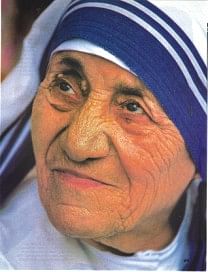The struggle for Mother Teresa

A recent edition of Time magazine had a short featured article under Postcard: Kolkata, written by Nilanjana Bhowmick. The bi-line says "The fight for Mother Teresa's remains." Mother Teresa is synonymous to India or in the context of the slums of Calcutta. On the eve of her upcoming centenary of birth in August 2010, Albania has demanded that her body be exhumed and flown back to Albania to be buried next to her mother and sister at the Albanian capital, Tirana. Albanian Prime Minister Sali Berisha made this demand to the government of India. It is predicted that Albania will most probably campaign with more intensity to claim her remains before her upcoming birthday. Since this official request was made, the entire nation of India is appalled. There have been protests and the nuns of Mother Teresa's order are wondering why Albania would raise the issue since Mother Teresa had little connection with the country, where she spent her adolescent years only. Fearing that Macedonia may also make such an unreasonable request, West Bengal's million member state forum has called for a mass protest, according to the magazine. The Indian foreign office has issued a statement saying, "Mother Teresa was an Indian citizen and she is resting in her own country, her own land." Her own Missionaries of Charity order has described such a request as absurd.
Mother Teresa was born Agnes Gonxha Bojaxhiu to her ethnic Albanian parents, who went to Albania from Macedonia. She was born in Skopje, Albania, which is now part of Macedonia, on August 26, 1910. She left Albania at age 18 when she felt there was a higher calling for her to go and to help others in a distant part of the world. Upon arriving in Calcutta, she joined the sisters of Loreto convent and taught there. That school was primarily for the privileged children of Calcutta. She later roamed through the streets of Calcutta and was very saddened by the plight of the "untouchables", the poor and the hungry. She decided to leave the convent to help the poor. She later founded the Missionaries of Charity. From then on the poor and the needy in Calcutta had Mother Teresa, who relentlessly tried her best to help by taking care of them. She was a symbol of grace who helped others to overcome struggle and tragedy and taught them to replace them with promise and dignity. To her each life was precious. Given an opportunity one can overcome all sorrows and difficulty and can fulfill their lives with hope. To her life was an adventure, and through her non-stop work to improve the quality of human life she worked unfailingly until the very end of her life.
Mother Teresa died at eighty-seven. Without her there was no one to fight for the destitute. She tried her best to restore the concept of human dignity with those who forgot about it because of their status and position in society. She frequented the leper colony and helped its inhabitants with whatever they needed, even with massage oil that was scarce to them. With that those people got relief when they applied it to their deformed hands without fingers. She touched and embraced them without any fear. She taught India many lessons and her voice was heard. Pope John Paul II and the Vatican accorded her a lot of respect and supported her cause.
Mother Teresa does not belong only to Calcutta; she belongs to the wider world where there is suffering and injustice against the poor, the helpless and the sick. She attained recognition in life and in death. She appeared on the cover of Time magazine way back in December 1975 ("A Living Saint"). A Nobel laureate, she died in Calcutta on 5 September 1997. She donated the money that was awarded to her when she received the Nobel Peace Prize to the destitutes of Calcutta. In her own words, "By blood I am Albanian. By citizenship I am Indian. By faith, I am a Catholic nun. As to my calling, I belong to the world."
It is ironic that Mother Teresa, who fought to eradicate poverty, disease and human suffering by roaming the streets of Calcutta should be disturbed in death. Someone who at night went looking for the poor, the hungry and the sick and took them with her and gave them food, shelter and endless love, should not be a subject for governmental wrangling. We should all join in protest and raise the demand that her remains not be disturbed.

 For all latest news, follow The Daily Star's Google News channel.
For all latest news, follow The Daily Star's Google News channel. 



Comments